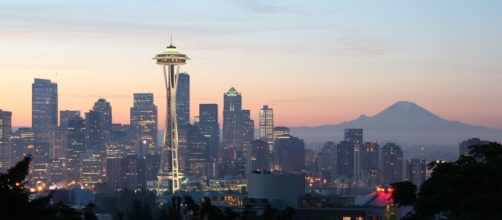To the surprise of many, environmental groups aren't supporting the new carbon tax initiative that will be voted on by Washington state in November because it’s revenue neutral and won’t expand the government. The new carbon tax, which would add 25 cents to every gallon of gasoline, increase airfare, and hike utilities, would also lower taxes in other areas to offset the higher prices. Their biggest problem is that the carbon tax doesn’t make government bigger, create green jobs, or expand government services.
Because the carbon tax would be revenue neutral, meaning there would be no extra money to add more government jobs and bureaucracy, green groups are adamantly opposed to the measure.
They’ve joined forces with an unlikely partner, the Washington State Labor Council, which also opposes the tax.
A proposed carbon tax in Washington state is dividing the region's environmental groups https://t.co/wXT8GP0FGe pic.twitter.com/d6vtGIFhwl
— Climate Central (@ClimateCentral) May 2, 2016
Success story in Canada
The carbon tax, which is based on a similar one in British Columbia, Canada, would impose a $25 per metric ton of greenhouse gasses emitted from various fossil fuels until hitting a cap of $100 a ton. It would increase prices at the pump, airfares, utility bills, heating costs, and hurt lower- to middle-income families the most. Because lower-income families are less likely to own and drive a car, they would be unduly burdened with higher heating bills or anything that relies on fossil fuels.
In British Columbia, they lowered carbon dioxide (CO2) emissions 16 percent and remained revenue neutral. To offset the higher energy costs, Washington state’s sales tax would drop by one percent, and it would eliminate nearly all taxes for manufacturing companies while giving rebates to lower-income families.
Beleaguered author
The author of ballot Initiative 732 (I-732), Yoram Bauman, doesn’t understand why green groups are so united in their opposition to the carbon tax. The very same environmental groups, he says, have been clamoring for years that greenhouse gas emissions from fossil fuels are responsible for global warming, and he’s shocked at the pushback he’s getting.
Me and @CarbonWA #Yeson732 on Fox News: Some enviros "fight proposed carbon tax – because it doesn't grow gov't" https://t.co/lWEnvtN9O1
— Yoram Bauman (@standupecon) August 2, 2016
All this has shown the ugly side of Big Green’s true motivations: to expand government by picking and choosing clean energy jobs and programs to fight climate change.
Instead of letting the marketplace determine which jobs are needed, the government would be in the driver’s seat. Even the Sierra Club says on its website that I-732 would not be used to create more jobs in renewable fuels, infrastructure, or jobs, and should be voted down.
Glimmer of hope
Bauman is determined that I-732 not hike taxes, and said its goal was never about growing the size of government but rather reducing CO2 emissions. Rich Stolz of One America, a group that advocates for lower-income minorities, said he would support I-732 if it raised taxes to fund new government programs and imposed more regulations on polluters.
The Audubon Society, however, supports the initiative. They echo Bauman’s comments and agree it’s about lowering CO2 emissions, not making government bigger.
One critic of I-732, Todd Myers, told Fox News the dust-up exposes the true motive of many environmental groups: they're more afraid of tax cuts and smaller governments than actual efforts to reduce greenhouse gas emissions. If the initiative increased taxes, regulations, and the size of government, green groups would readily endorse it.

